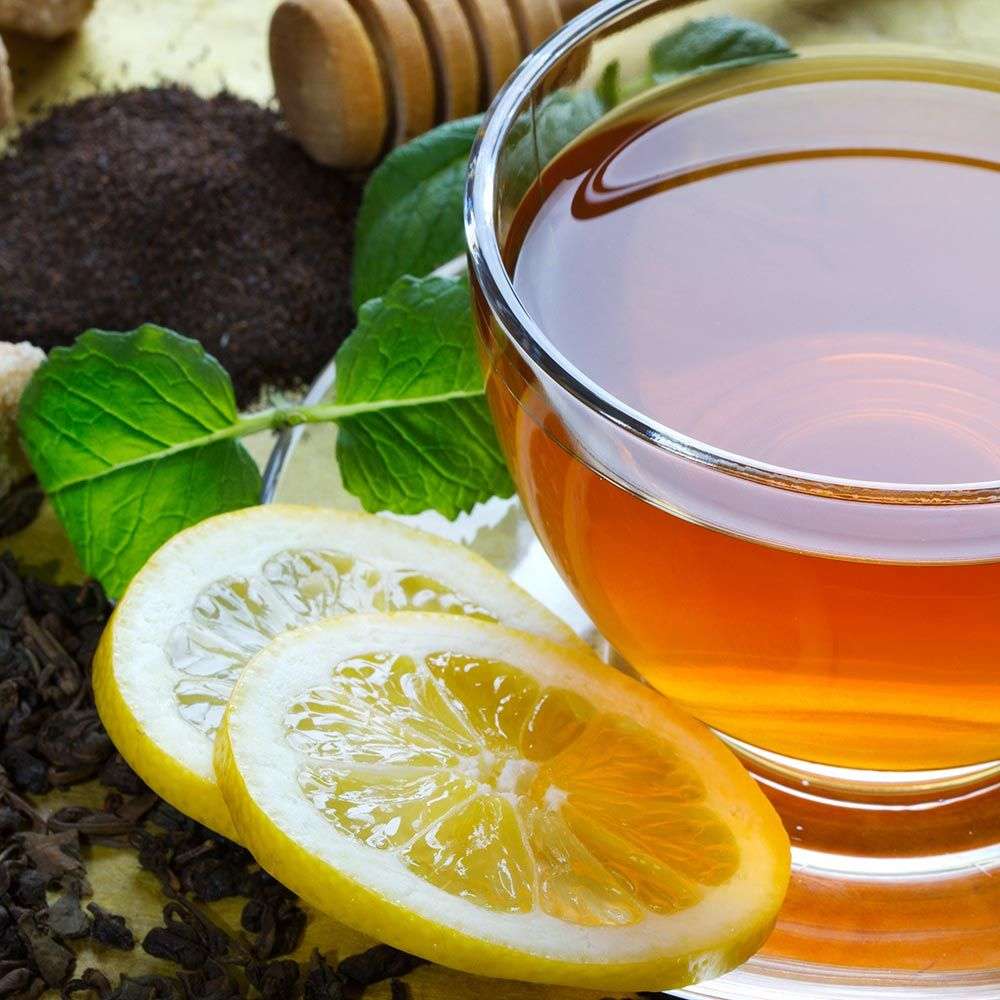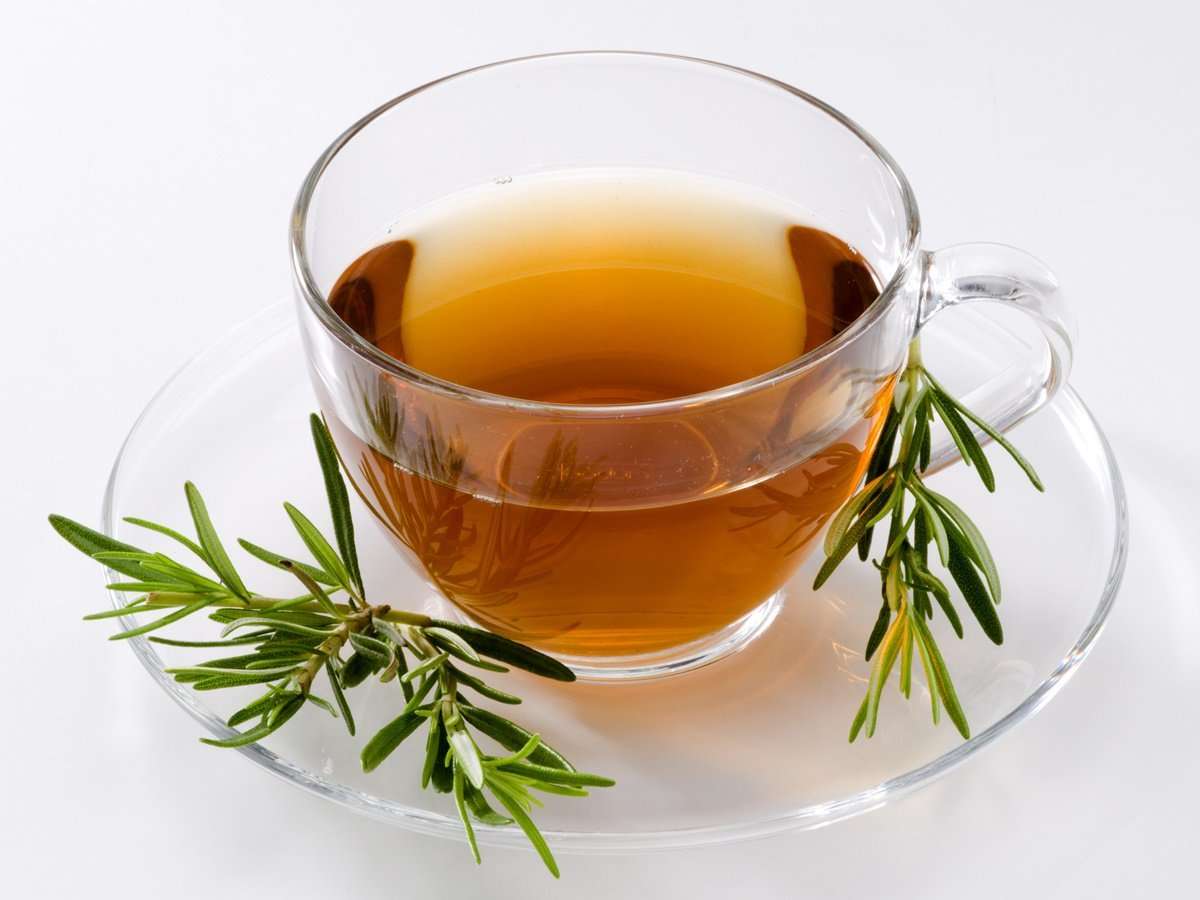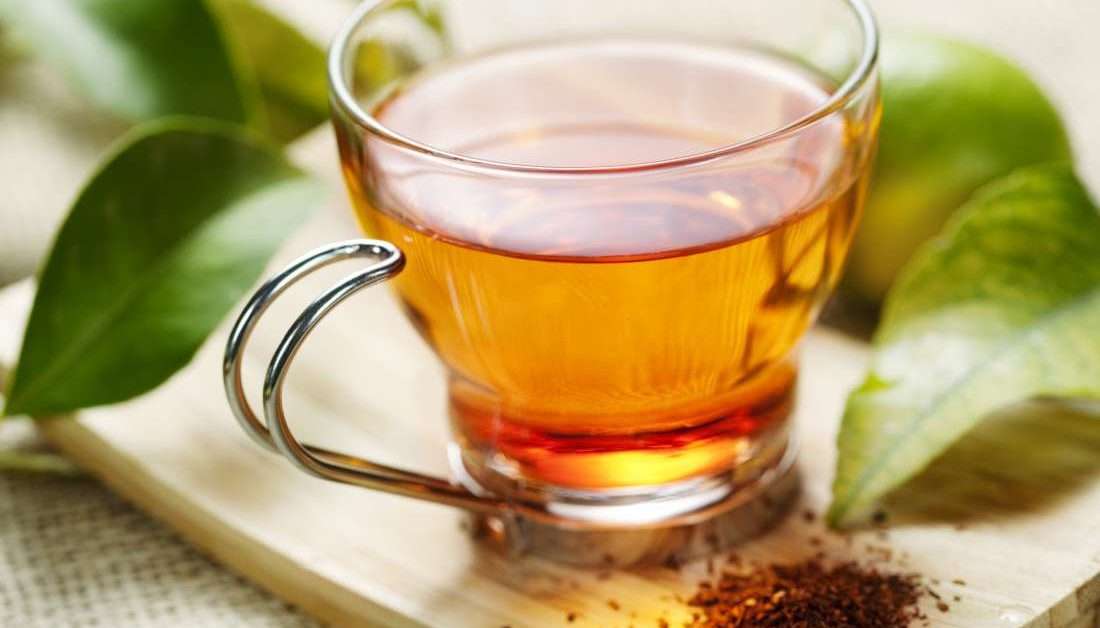Ginger Tea May Help Treat Nausea And Vomiting
Got tummy troubles or a bout of morning sickness? You may want to steep some ginger tea, which is well known for its ability to help ease digestive stress.
According to a review published in March 2016 in the journal Integrative Medicine Insights, ginger, an ancient root known for its medicinal properties, is a safe and effective treatment for nausea and vomiting.
Research also suggests that ginger helps reduce post-chemotherapy nausea in adults with cancer by 40 percent. Furthermore, gingerols, the compounds that give ginger its characteristic taste and smell, may be useful in therapies that help protect against diseases like diabetes and cancer, that research notes.
To enjoy ginger tea, grate the root, put the pieces at the bottom of a mug, pour hot water on top, and let it steep for a couple of minutes. To avoid the DIY route, buy prepackaged tea bags made with dried ginger.
RELATED: How to Manage the Side Effects of Chemotherapy
Milk Thistle And Dandelion
People use these brews for problems with their liver and gallbladder. Dandelion tea wonât harm you — unless youâre allergic to the yellow-flowered weed — but studies havenât shown that itâs helpful, either. The main ingredient in milk thistle is called silymarin, and one study found that it may ease symptoms of hepatitis C. Researchers believe itâs safe for most people.
How To Make An Herbal Bath Tea
Select herbs.
Use a total of about 8 tablespoons of herbs if filling a muslin bag. This amount is very flexible, so adjust as needed.
If you are using a circle of fabric instead of a muslin bag, you will need to reduce this amount to 2-3 tablespoons. Decide if you will include any additions. Again, choose one or more .
Place ingredients in a muslin tea bag.
Muslin bags can be purchased online and in some health food stores, or try making your own. .
To use: tie bath bag under faucet so the water will go through the herbs as the bath tub fills with water. Once the bath is full, remove the bag from the facet and float in the water. Soak in the bath for 20 minutes.
You May Like: How Much Sugar Is In Twisted Tea Half And Half
Final Thoughts On Various Types Of Herbal Teas And Their Uses
There are many different types of herbal teas, and each one has its own distinct flavor and set of health benefits.
The best part is that, with the exception of yerba-mate tea, most of these teas are caffeine-free. As a result, they are an excellent choice for an afternoon or evening drink.
Herbal teas are also simple to prepare. The most important thing to remember is to use boiling water and to keep track of the steeping time. Every herbal tea has a different steeping time, which is indicated on the label whether you use tea bags or loose herbs.
Its a good idea to experiment with different herbal teas before settling on the one thats right for you.
Finally, prepare a new herbal tea, one youve never tried before, and enjoy that wonderful cup of tasty and warm tea!
How To Make Tea

Making herbal tea is simple, and you can pretty much follow the same tea recipe for each herb or plant, with perhaps a few changes depending on the type.
In general, add about one tablespoon of plant roots, stems or flowers to one cup of boiling water. Then let the plant parts steep in simmering water or hot water that has been removed from heat.
Steep times vary from plant to plant most commonly five to 15 minutes.
For plant parts, you can use them fresh, dried or even in extract form. Adding one to two drops of a high-quality essential oil, for example, can make an herbal tea.
Some herbal teas taste more earthy than others, so adding lemon, honey or stevia is a great option for sweetening your tea. If you add raw honey, make sure the tea cools first.
Read Also: Is Gold Peak Green Tea Good For You
Fennel Tea May Ease Menopause Symptoms
Another tea that helps with digestion? Fennel. Fennel also relaxes digestive muscles to help with bowel regularity, says Al Bonchi. A review published in the Arabian Journal of Chemistry in November 2016 says that fennel, which has long been known as a medicinal plant, is widely used for treating digestive issues as well as IBS. The review cites polyphenols as one reason for fennels antioxidant properties.
Furthermore, fennel may help ease menopause symptoms in postmenopausal women without serious side effects, according to a small study using fennel in capsule form, which was published in September 2017 in the journal Menopause.
Interested in trying fennel tea? You can buy fennel tea in tea bags or crush fennel seeds and steep for a few minutes in a tea ball.
Amla Green Hibiscus Tea
Page Medically Reviewed and Edited by Cyrus Khambatta, PhD
Herbal tea has been used as a herbal remedy for centuries, and it’s no wonder why. It is safe, easy to make, delicious, and full of health benefits. But what if you could take the health-boosting power of herbal tea to the next level?
In this article, we’ll talk about the many reasons you should definitely consider adding herbal tea to your diet and talk about how we’re taking the health-boosting powers of hibiscus to the next level with amla, the most powerful superfood on the planet.
Recommended Reading: Is Menoslim Tea Safe
Would You Like Some Tea
Hopefully, you want to incorporate more herbal tea into your diet after learning about these health-promoting properties and herbal tea benefits.
Our suggestion is to look at the above list of 30 teas and purchase one that provides the specific benefit youre seeking. It s important to remember that when it comes to your health, it isn’t just about the foods you eat, but also the drinks you choose. That’s why you should commit to making drinking tea a habit and using one of the types of herbal that we covered on this page.
Why Plant An Herbal Tea Garden
Yes, its true, there are many herbal tea blends on the market to choose from these days, but often the ingredients have been treated with pesticides. And you never know when those herbs were picked, so freshness is always a gamble.
I see the words flavoring in more and more herbal tea blends too.
Im always hesitant to buy something if they dont tell me what the actual ingredient is.
Also Check: Is Gold Peak Green Tea Good For You
Why Different Varieties Of Herbal Teas Cause And Prevent Teeth Stains
There are a few elements and properties in herbal tea that can cause teeth stains.
Starting with caffeine, tannins, catechins, and acidity, the greater the composition of these elements in herbal tea the more likely it is to cause teeth stains.
And on the subject of caffeine, many herbal teas are in fact, caffeine-free.
Tannins and catechins tend to be in the range of very low to neutral in most herbal teas. These neutral ranges of tannins and catechins can be intensified and increased to cause teeth stains . which depends on how the tea is made.
There are a few elements and properties in herbal teathat can cause teeth stains
Depending on how herbal tea components like the leaves and other plant materials are processed, there are possibilities for releasing some staining elements.
And depending on how intense the composition of these staining elements is, determines if teeth will stain and to what degree.
In true tea varieties during processing, most of these staining elements are released, thereby contributing to teeth stains.
Applications To Health Promotion And Disease Prevention
In Greek ethnic medicine, a herbal tea composed of caper roots and young shoots has allegedly antirheumatic activity. Sprouts, leaves, roots, and seeds are used for treating inflammation. In ancient Xinjiang, in China, root bark of caper was consumed for the treatment of asthma, cough, dermatologic disease, paralysis, scrofula, splenic disease, and toothache. In Turpan, almost ripe caper fruits are collected by indigenous pharmacologists for treating rheumatism. Traditionally, Capparis spinosa has been used for the treatment of flatulence, rheumatism, liver function, arteriosclerosis, and kidney infection, and as an antihelminthic and tonic. Its root bark extract has been employed for anemia, arthritis, edema, and gout. In Israel, capers have also been used for treating hypoglycemia. Rutin is a non-toxic antioxidant bioflavonoid formed in capers, and utilized as a dietary supplement for capillary fragility. Capers have an extremely high abundance of the powerful antioxidant, quercetin. Caper seeds have a high content of protein, oil, and fiber, and have a potential value as food . They can be used as a condiment due to their peppery flavor. In Egypt, the seeds are added to wine to prevent deterioration. Caper seeds also have a medicinal value because of the presence of ferulic acid and sinapic acid. Seeds that have been boiled in vinegar may alleviate toothache.
TABLE 33.1. Characteristics of Proteins with Medicinal Applications in Caper Seeds
Recommended Reading: Contents Of Long Island Iced Tea
Are All Herbal Teas Caffeine Free
Caffeine is not present in the majority of herbal teas. However, this does not imply that all herbal teas are caffeine-free. Caffeine is naturally present in yerba mate tea, for example.
Yerba Mate is a caffeine-containing herbal tea from South America. If caffeine content is an issue for you, make sure to read the labels on the herbal teas you choose.
Finding The Right Cup Of Tea

Tea is an amazing drink offering a third of the caffeine in coffee for a gentler morning jolt and still enriching the body which allows you to drink more of it and more often– especially good as most tea leaves can be steeped several times before depleting their flavor. The substance l-theanine, an amino acid that studies have linked with feeling of calm and wellbeing, can also be found in different types of teas making them a much healthier choice than other caffeinated drinks.
Tea is the most popular drink in the world after water and is grown in every continent, save Antarctica. With hundreds of styles and varieties and different methods of brewing, theres no right or wrong way to drink tea. Every type of tea is a product of the same plant, a shrub called Camellia sinensis thats native to a band of subtropical land stretching from eastern India through northern Laos and Vietnam into southwestern China. Each tea develops its own unique flavor identity through different harvesting and processing methods . Herbal and flower teas are different but well explain those below. Here we explain the difference in origins and flavor profiles of green tea, matcha, mate, flower tea, and pu-erh.
Green Tea
Matcha Tea
Mate
Flower Tea
Pu-Erh
Whatever your flavor or brewing preferences are, rest assured that you will find the right cup of tea for yourself. Browse our flower teas and find out more about our flavor profiles and benefits.
Herbal and flower teas are my favorite 🙂
Don’t Miss: Does Starbucks Sell Boba
Health Benefits Effects Of Plant Phytochemicals
Herbal teas and beverages contain bioactive compounds or phytochemicals which have been reported to have beneficial effects in the prevention of metabolic disease such as diabetes, glucose intolerance, and obesity. These plant compounds like polyphenols have been associated with antioxidant, antiinflammatory, antineoplastic, and antimutagenic effects in experimental animals while epidemiological surveys in humans have demonstrated an inverse relationship between the risk of chronic disease and the consumption of polyphenols .
There are suggestions that polyphenols exert their beneficial effects by modulating cellular function, via their actions at different protein kinase and lipid kinase signaling cascades like phosphoinositide 3-kinase, mitogen-activated protein kinases , tyrosine kinases, and protein kinase C, resulting in the alteration of the phosphorylation state of target molecules and/or gene expression .
In , 2016
Lower Blood Pressure With Comparable Benefits To Medication
Amla has some incredible potential health benefits when it comes to your heart and heart disease. In fact, studies suggest that amla works so extensively within your body, that it can provide similar benefits to common blood pressure medications, and can also help lower your cholesterol!
Note: While we’re big proponents of amla, nothing can replace professional medical advice from your trusted doctor. Check with them!
Read Also: Star Bucks Boba
Likely Or Possibly Safe Herbal Teas
Peppermint tea: Peppermint is one of the most commonly used herbal medicines in pregnancy. Studies have shown it doesnt harm the mother or baby, although you should avoid very large amounts and avoid in the first trimester because it can promote menstruation.
Red raspberry leaf tea: Some women drink raspberry tea during the last trimester to help them prepare for the birth. It should be safe in pregnancy, but some studies have shown it can stimulate contractions so its a good idea to be cautious during the first trimester.
Ginger tea: Ginger can help relieve nausea. It should be safe in moderation while you are pregnant or breastfeeding.
Green tea: Green tea isn’t a true herbal tea. It contains caffeine, so you should limit how much you drink during pregnancy and breastfeeding.
Chamomile tea: A cup of chamomile tea before bed may relax you, but again, avoid drinking large quantities. There is a suggestion it could stimulate the uterus or lead to circulation problems in your baby.
Herbal Tea Benefits + How To Make At Home
Herbal tea is made from plants that have therapeutic properties, with impressive nutritional value and health-promoting antioxidants. This type of tea is commonly consumed in traditional medicine to help the body maintain balance and ward off illness.
Adding a daily cup of herbal tea to your diet can boost your antioxidant intake by a whole lot, help support a healthy heart and brain, and support digestive health. Its an easy way to combat oxidative stress that can cause illness, promote healthy aging and keep your body in balance.
Read Also: Does Dunkin Donuts Sell Boba Tea
Lemon And Ginger Tea Circulation
A recent A.Vogel survey found that participants favoured lemon and ginger tea over any other herbal variety. With its refreshing mix of spice and citrus, it’s easy to see why this is the case. What about the health benefits, though? Could these also be enticing people?
Ginger, for one, certainly has lots to offer. It has traditionally been used as a digestive aid and is known to help ease nausea and motion sickness.1 It also contains anti-inflammatory properties which could help with a range of issues, from menstrual cramps to headaches.
Lemon and ginger together could be stimulating for your circulation, plus this combination provides plenty of immune-boosting antioxidants.
Top tip: If you have a cold or flu, I’d recommend mixing some honey into a lemon and ginger tea as this can help calm symptoms like coughing, a sore throat and congestion.
Nutritional Value Of Herbal Tea
No matter which herbal tea you are sipping on, it has a huge nutritional value. As said earlier, herbal teas come loaded with nutritional value. as The criteria for the nutritional value is 1 mug of an herbal tea, which is approximately 8 fl Oz or can say 100 g. Its nutrional value is defined below.
Nutritional Value:
List of nutritional content in 100g or an herbal tea-
- It has a saturated fat up to 0.005g which is nearly 0%.
- It has monounsaturated fat and polyunsaturated fat up to 0.012g and 0.002g.
- The cholesterol level in herbal tea is 0mg which is 0%.
- Sodium and Potassium found in herbal tea are also in very small quantity, which is roughly up to 2mg and 21mg, respectively.
- Herbal tea does not contain dietary fiber and sugars.
- It contains Vitamins A and C.
Recommended Reading: Does Dunkin Donuts Have Boba
Drinking Mindfully A Cup Of Tea Can Bring Us On A Voyage To The Gift Of The Universe 5 Best Herbal Teas To Reinforce Your Mindfulness Practices Today
I have to say immediately, there is no best herbal teas for mindfulness. Its the practice of mindful drinking that brings the best teas! But choosing a tasty and safe herbal tea can help us enjoy our practice, and reinforce our connection with the Earth.
When we practice mindfulness, drinking a cup of tea is drinking a cloud. From the water contained in this small cup, thousands of drops that come from different clouds, perhaps all over the world. Something as simple and ordinary as a cup o tea can bring us a lot of joy. The way we drink our tea can transform our life. The only thing we need is to bring into it all our mindful presence, and choose a good tea!
Indeed, the benefits of herbal teas to our well-being have been long known. Many studies reclaimed these. Herbal teas can help to lower cortisol levels. Increase the production of mood-enhancing hormones like GABA , and dopamine. Thereby helping you to feel calmer and less anxious .
A good herbal tea helps you unwind from a busy and tiring day. Its a great mindful moment to listen to our body, calm down our mind. Let us choose the best teas and start practice today!
Rooibos Tea Is Made From A Plant Called Aspalathus Linearis It Grows Only In South Africa The Red Rooibos Tea That We Usually See Is The Fermented Tea Its Considered The Best Herbal Tea In The World It Is Caffeine

My choice
Have you tried the Rooibos des vahinés? It has always been my best choice. Its a warm and sophisticated blend of red rooibos, almond, and vanilla. It offers a delicious pairing of vanilla and almond against a delicate rooibos backdrop. This caffeine-free tea will enchant you with several flavor notes.
Read Also: Is Black Tea Good For Uti